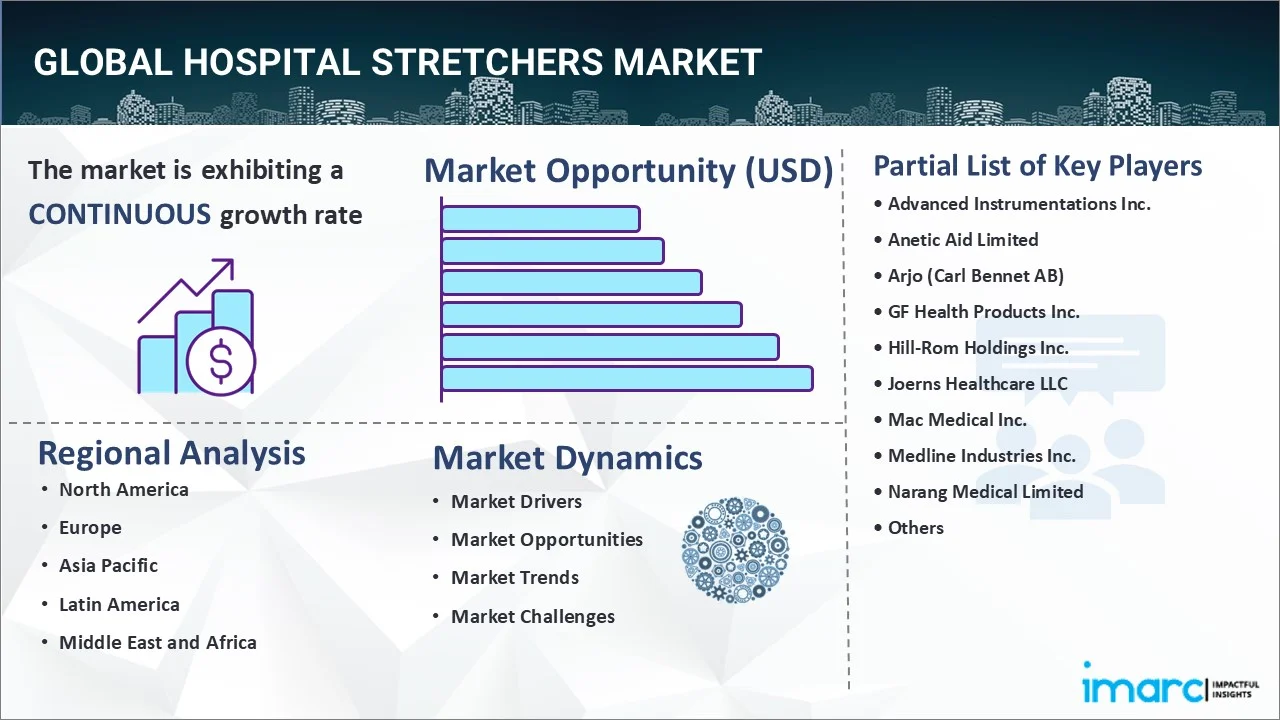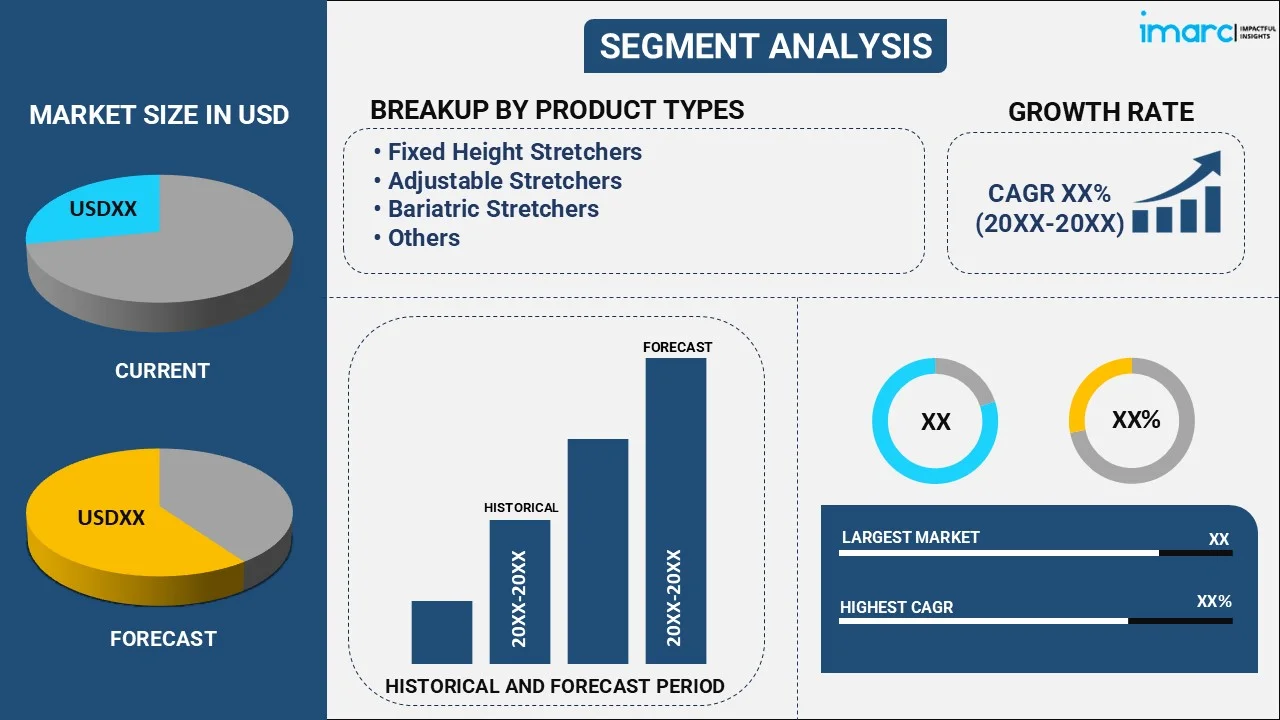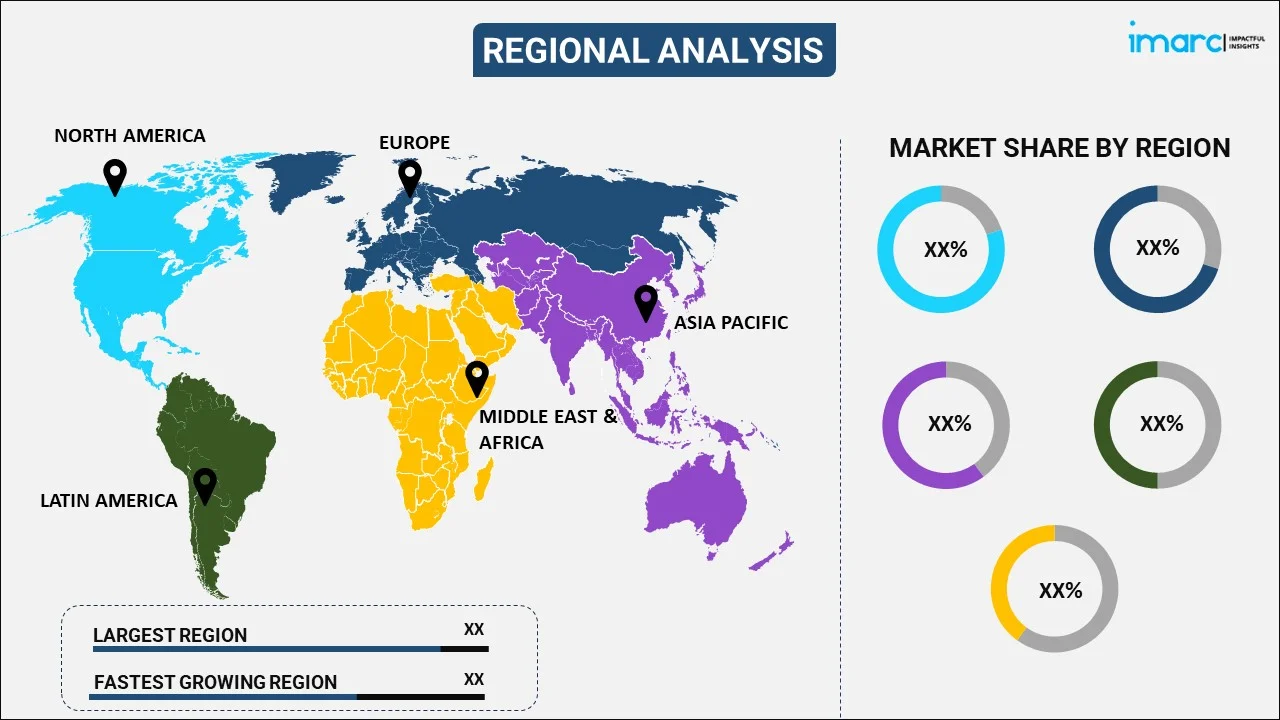
Hospital Stretchers Market Report by Product Type (Fixed Height Stretchers, Adjustable Stretchers, Bariatric Stretchers, and Others), Technology (Motorized Stretchers, Non-Motorized Stretchers), Application (Intra-Hospital, Pediatric Care, Emergency Department, Radiology Department, and Others), and Region 2025-2033
Hospital Stretchers Market Size:
The global hospital stretchers market size reached USD 3.0 Billion in 2024. Looking forward, IMARC Group expects the market to reach USD 4.5 Billion by 2033, exhibiting a growth rate (CAGR) of 4.5% during 2025-2033. The increasing incidence of chronic diseases, the rising elderly population, the growing number of surgical procedures, the rapid technological advancements in medical equipment, the expansion of healthcare infrastructure, and the increased prevalence of emergency cases and accidents are some of the factors propelling the market.
|
Report Attribute
|
Key Statistics
|
|---|---|
|
Base Year
|
2024
|
|
Forecast Years
|
2025-2033
|
|
Historical Years
|
2019-2024
|
|
Market Size in 2024
|
USD 3.0 Billion |
|
Market Forecast in 2033
|
USD 4.5 Billion |
| Market Growth Rate 2025-2033 | 4.5% |
Hospital Stretchers Market Analysis:
- Major Market Drivers: Increasing incidence of chronic diseases and an aging population drive the demand for hospital stretchers. Additionally, the rise in surgical procedures and emergency cases further propels market growth.
- Key Market Trends: Technological advancements in stretcher designs and features enhance patient comfort and safety. Additionally, there is a growing preference for multifunctional and specialized stretchers in hospitals.
- Geographical Trends: North America dominates the hospital stretchers market due to advanced healthcare infrastructure and high healthcare expenditure. The Asia-Pacific region is expected to witness significant growth owing to expanding healthcare facilities and increasing medical tourism.
- Competitive Landscape: Some of the key market players include Advanced Instrumentations Inc., Anetic Aid Limited, Arjo (Carl Bennet AB), GF Health Products Inc., and Hill-Rom Holdings Inc, among others.
- Challenges and Opportunities: High costs and stringent regulations pose challenges to market growth. However, opportunities lie in the emerging markets and the continuous development of advanced and cost-effective stretcher solutions.

Hospital Stretchers Market Trends:
Increasing prevalence of chronic disorders
According to America's Health Rankings 2023 annual report, in 2022, more than 29 million adults reported having three or more chronic conditions. Furthermore, in the same year, more than 29 million persons were found to have three or more chronic diseases. These chronic illnesses, which include arthritis, asthma, chronic renal disease, Chronic Obstructive Pulmonary Disease (COPD), cardiovascular disease, cancer, depression, and diabetes, all contribute to the increased requirement for hospitalization across the globe. This, in turn, is bolstering the hospital stretchers demand.
Rising incidence of road accidents
The rising incidence of road accidents also accelerates the demand for hospital stretchers. For instance, in August 2022, the National Safety Council reported a 16.9% year-on increase in road accidents in the US in 2021. Therefore, as the number of road accidents rises, so does the need for hospital stretchers, as stretchers play an important role in transporting patients during times of injury, catalyzing market expansion. Even the most basic kind of stretcher is meant to keep the injured person calm and secure, reducing the possibility of further injury while transporting them to a medical institution. Stretchers are frequently fitted with restraints to guarantee patient safety and reduce the chance of falling. This, in turn, is fostering hospital stretchers market growth.
Growing initiatives by the key players
Key strategies implemented by the market players include new product releases, expansion, acquisitions, collaborations, and other activities. Wideblue, a product design company, formed a joint venture with SME Science to Business and the East Anglian Air Ambulance (EAAA) in July 2022 to create a unique patient transport technology. This has also received funding assistance from the National Institute for Health and Care Research (NIHR). The product under development included a heating element powered by a rechargeable battery that targeted the torso and shoulders. Furthermore, some of the players are also focusing on integrating smart technologies, IoT connectivity, and remote monitoring capabilities in these stretchers, thereby capturing a larger hospital stretchers market share.
Hospital Stretchers Market Segmentation:
IMARC Group provides an analysis of the key trends in each segment of the market, along with forecasts at the global, regional, and country levels for 2025-2033. Our report has categorized the market based on product type, technology, and application.
Breakup by Product Type:

- Fixed Height Stretchers
- Adjustable Stretchers
- Bariatric Stretchers
- Others
Bariatric stretchers dominate the market
The report has provided a detailed breakup and analysis of the market based on the product type. This includes fixed height, adjustable, bariatric stretchers, and others. According to the report, bariatric stretchers represented the largest segment.
As per the hospital stretchers market forecast, the bariatric segment dominated the market with the largest revenue share. Bariatric stretchers have larger frames, outsized wheels, winch attachments and pull and push handles for easy transportation. Stretchers of this type are commonly used to transport obese individuals. Obesity is a major public health concern that causes a variety of chronic diseases and consequences, including diabetes, cardiovascular disease, and cancer. As a result, the rising prevalence of obesity-related hospitalizations is driving up demand for bariatric stretchers. Bariatric stretchers can accommodate weights of up to 700 pounds. Additionally, using motorized hi/low stretchers can help with patient movement and placement. As a result, the current increase in the obese population is a substantial contributor to the segment's market growth.
Breakup by Technology:
- Motorized Stretchers
- Non-Motorized Stretchers
Motorized stretchers hold the largest share in the market
A detailed breakup and analysis of the market based on the technology have also been provided in the report. This includes motorized and non-motorized stretchers. According to the report, motorized stretchers accounted for the largest market share.
According to hospital stretchers market report, the motorized segment dominated the market with the largest revenue share. The segment growth is due to key players' increased expenditure in launching cutting-edge and innovative products. Motorized stretchers, also known as electric stretchers or powered stretchers, use a motorized device to help move and modify the stretcher. This improves the stretcher's functionality, providing additional functions and advantages over manual stretchers. Most motorized stretchers include adjustable height choices, allowing healthcare professionals to place them at their preferred level. This facilitates transferring patients to and from beds and operating tables. Motorized stretchers are contributing to a higher hospital stretchers market revenue. New technological advancements in hydraulic and pneumatic stretchers are bolstering the product demand in developed nations.
Breakup by Application:
- Intra-Hospital
- Pediatric Care
- Emergency Department
- Radiology Department
- Others
Emergency department hold the maximum share in the market
A detailed breakup and analysis of the market based on the application have also been provided in the report. This includes intra-hospital, pediatric care, emergency department, radiology department, and others. According to the report, emergency department accounted for the largest market share.
In terms of application, the emergency department dominated the hospital stretchers market overview, accounting for the highest revenue share. The increasing frequency of road traffic accidents or emergency trauma cases has contributed to segment expansion. In addition, work-related injuries are common in emergency departments. As the number of patients grows, so will the demand for hospital stretchers in emergency situations. Furthermore, patient transfers via emergency/trauma stretchers run smoothly even in the presence of a crowd. Furthermore, most of these stretchers are quite inexpensive and may not require professional caregivers to handle patients. This, in turn, is creating a positive hospital stretchers market outlook.
Breakup by Region:

- North America
- United States
- Canada
- Asia-Pacific
- China
- Japan
- India
- South Korea
- Australia
- Indonesia
- Others
- Europe
- Germany
- France
- United Kingdom
- Italy
- Spain
- Russia
- Others
- Latin America
- Brazil
- Mexico
- Others
- Middle East and Africa
North America leads the market, accounting for the largest hospital stretchers market share
The market research report has also provided a comprehensive analysis of all the major regional markets, which include North America (the United States and Canada); Asia Pacific (China, Japan, India, South Korea, Australia, Indonesia, and others); Europe (Germany, France, the United Kingdom, Italy, Spain, Russia, and others); Latin America (Brazil, Mexico, and others); and the Middle East and Africa. According to the report, North America represents the largest regional market for hospital stretchers.
North America dominated the hospital stretchers industry and is likely to maintain its dominance throughout the forecast period. Increased awareness among the healthcare community and patients about the necessity of early identification and treatment for chronic diseases is favoring the demand for hospital stretchers. For example, the Centers for Medicare & Medicaid Services (CMS) predicted that healthcare spending in the United States will rise to 7.5% by 2022. This increasing healthcare spending has stimulated market growth. Furthermore, high disposable income levels contribute to the large market dominance. As a result, increased healthcare infrastructure and improved healthcare facilities are predicted to lead to hospital stretchers market recent developments.
Competitive Landscape:
The market research report has provided a comprehensive analysis of the competitive landscape. Detailed profiles of all major companies have also been provided. Some of the key players in the market include:
- Advanced Instrumentations Inc.
- Anetic Aid Limited
- Arjo (Carl Bennet AB)
- GF Health Products Inc.
- Hill-Rom Holdings Inc.
- Joerns Healthcare LLC
- Mac Medical Inc.
- Medline Industries Inc.
- Narang Medical Limited
- Paramount Bed Co. Ltd.
- Stiegelmeyer GmbH & Co. KG
- Stryker Corporation
- Winco Mfg. LLC (Champion Manufacturing Inc.)
(Please note that this is only a partial list of the key players, and the complete list is provided in the report.)
The major hospital stretchers companies have made product innovations, such as the introduction of stretchers with multiple accessories, such as lifting bridles, spine immobilizer, toe clamp, shoulder harness, etc. Key competitors are accelerating growth through innovation, strategic collaborations, and global expansion. They spend in R&D to include features like changeable height and integrated monitoring systems. Strategic acquisitions and collaborations allow these organizations to broaden their product offerings and market reach. Furthermore, players are targeting emerging countries with low-cost solutions to meet the rising demand for healthcare infrastructure. Key companies set industry standards and fulfill the changing needs of healthcare providers by harnessing innovative technology while maintaining a strong focus on quality and efficiency, thereby offering numerous hospital stretchers market recent opportunities.
Hospital Stretchers Market News:
- April 16, 2024: GF Health Products, Inc. announced that it has acquired substantially all of the assets of Transfer Master Products, Inc. TMP has been in the business of designing and manufacturing quality hi-low adjustable beds for home and healthcare settings for over 30 years.
- April 17, 2024: Joerns Healthcare, a leader in designing and manufacturing innovative healthcare equipment solutions, and ONDO Systems, a trailblazer in the healthtech field, announced that they have entered a strategic channel partnership to develop new technology-enabled capabilities for Joerns products. Together they are building an enabling connected care ecosystem targeted to simplify clinical and workflow solutions while easing the burden on clinical and operational staff.
- May 21, 2024: MAC Medical, Inc. and Dorian Drake International Inc. entered into a strategic partnership for export sales and distribution of medical equipment and solutions for healthcare facilities.
Hospital Stretchers Market Report Scope:
| Report Features | Details |
|---|---|
| Base Year of the Analysis | 2024 |
| Historical Period | 2019-2024 |
| Forecast Period | 2025-2033 |
| Units | Billion USD |
| Scope of the Report |
Exploration of Historical Trends and Market Outlook, Industry Catalysts and Challenges, Segment-Wise Historical and Future Market Assessment:
|
| Product Types Covered | Fixed Height Stretchers, Adjustable Stretchers, Bariatric Stretchers, Others |
| Technologies Covered | Motorized Stretchers, Non-Motorized Stretchers |
| Applications Covered | Intra-Hospital, Pediatric Care, Emergency Department, Radiology Department, Others |
| Regions Covered | Asia Pacific, Europe, North America, Latin America, Middle East and Africa |
| Countries Covered | United States, Canada, Germany, France, United Kingdom, Italy, Spain, Russia, China, Japan, India, South Korea, Australia, Indonesia, Brazil, Mexico |
| Companies Covered | Advanced Instrumentations Inc., Anetic Aid Limited, Arjo (Carl Bennet AB), GF Health Products Inc., Hill-Rom Holdings Inc., Joerns Healthcare LLC, Mac Medical Inc., Medline Industries Inc., Narang Medical Limited, Paramount Bed Co. Ltd., Stiegelmeyer GmbH & Co. KG, Stryker Corporation, Winco Mfg. LLC (Champion Manufacturing Inc.), etc. |
| Customization Scope | 10% Free Customization |
| Post-Sale Analyst Support | 10-12 Weeks |
| Delivery Format | PDF and Excel through Email (We can also provide the editable version of the report in PPT/Word format on special request) |
Key Benefits for Stakeholders:
- IMARC’s industry report offers a comprehensive quantitative analysis of various market segments, historical and current market trends, market forecasts, and dynamics of the hospital stretchers market from 2019-2033.
- The research report provides the latest information on the market drivers, challenges, and opportunities in the global hospital stretchers market.
- The study maps the leading, as well as the fastest-growing, regional markets. It further enables stakeholders to identify the key country-level markets within each region.
- Porter's five forces analysis assists stakeholders in assessing the impact of new entrants, competitive rivalry, supplier power, buyer power, and the threat of substitution. It helps stakeholders to analyze the level of competition within the hospital stretchers industry and its attractiveness.
- The competitive landscape allows stakeholders to understand their competitive environment and provides insight into the current positions of key players in the market.
Key Questions Answered in This Report
The global hospital stretchers market was valued at USD 3.0 Billion in 2024.
We expect the global hospital stretchers market to exhibit a CAGR of 4.5% during 2025-2033.
The rising incidences of road accidents, along with the advent of stretchers with multiple accessories, such as lifting bridles, head/spine immobilizer, toe clamp, etc., are primarily driving the global hospital stretchers market.
The sudden outbreak of the COVID-19 pandemic has led to the increasing demand for hospital stretchers with additional attachments, such as ventilators and support extensions for the critically infected-COVID-19 patients.
Based on the product type, the global hospital stretchers market can be segmented into fixed height stretchers, adjustable stretchers, bariatric stretchers, and others. Among these, bariatric stretchers currently hold the majority of the total market share.
Based on the technology, the global hospital stretchers market has been divided into motorized stretchers and non-motorized stretchers, where motorized stretchers exhibit a clear dominance in the market.
Based on the application, the global hospital stretchers market can be categorized into intra-hospital, pediatric care, emergency department, radiology department, and others. Currently, emergency department accounts for the largest market share.
On a regional level, the market has been classified into North America, Asia-Pacific, Europe, Latin America, and Middle East and Africa, where North America currently dominates the global market.
Some of the major players in the global hospital stretchers market include Advanced Instrumentations Inc., Anetic Aid Limited, Arjo (Carl Bennet AB, GF Health Products Inc., Hill-Rom Holdings Inc., Joerns Healthcare LLC, Mac Medical Inc., Medline Industries Inc., Narang Medical Limited, Paramount Bed Co. Ltd., Stiegelmeyer GmbH & Co. KG, Stryker Corporation, and Winco Mfg. LLC (Champion Manufacturing Inc.).
Need more help?
- Speak to our experienced analysts for insights on the current market scenarios.
- Include additional segments and countries to customize the report as per your requirement.
- Gain an unparalleled competitive advantage in your domain by understanding how to utilize the report and positively impacting your operations and revenue.
- For further assistance, please connect with our analysts.
 Request Customization
Request Customization
 Speak to an Analyst
Speak to an Analyst
 Request Brochure
Request Brochure
 Inquire Before Buying
Inquire Before Buying




.webp)




.webp)












